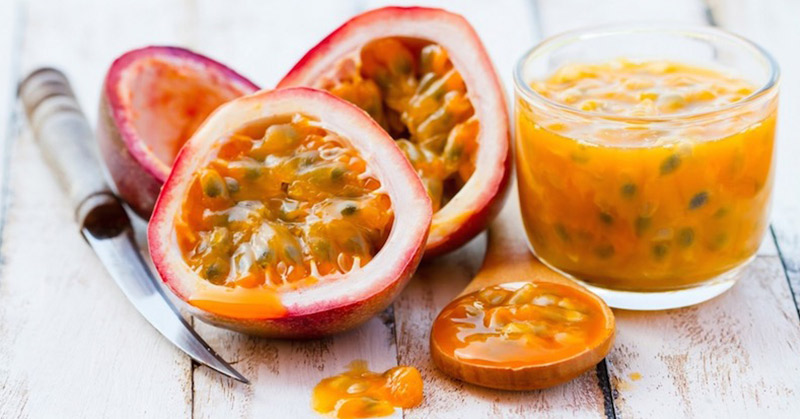What’s a fruit you can eat that’s like a trip to a health retreat in the tropics and a deliciously sweet snack all in one bit? Passion fruit!
Though not commonly found in the North American fruit basket, passion fruit is loaded with health benefits that will make you reconsider its place on your kitchen counter.
Read: 13 products linked to increased cancer risk
Quick Nutrition Facts About Passion Fruit
For a very small caloric hit, this small fruit packs in a ton of nutrients, vitamins, and minerals!
Here are the macronutrient facts for 1 fruit (1):
| Calories | 17 |
| Protein | 0.4g |
| Carbs | 4.2g |
| Fiber | 1.9g |
| Sugar | 2.0g |
Despite its small macronutrient stature, it contains plenty of micronutrients (vitamins, minerals, etc) that make this fruit worth your while, including (1, 2, 6):
- Calcium
- Iron
- Magnesium
- Phosphorus
- Potassium
- Zinc
- Copper
- Selenium
- Vitamin C
- Riboflavin
- Niacin
- Vitamin B-6
- Folate
- Choline
- Vitamin A (as Beta Carotene)
- Vitamin K
- Other Polyphenols and antioxidants
That’s a long list of goodness! While that’s all well and good, what does it mean for you? Let’s make sense of all this nutrient talk and clear up why passion fruit should be a mainstay in everyone’s diet.
6 Health Benefits of Passion Fruit
- Possible Anti-cancer effects
At its most basic, cancer is formed when abnormal cells in our body grow out of control and for masses called tumors. (3) Many of these can be caused by free radicals in your body, which are unstable molecules that can cause harm when in excess. (4)
Passion fruit contains high levels of antioxidants, or molecules that neutralize free radicals. (4) The vitamin C and flavonoids in passion fruit make it a valuable addition to you diet. Test tube studies, have taken a look at its potential use for cancer prevention and treatment. (5) - Immunity-Boosting
Again due to its high in antioxidant content, passion fruit can help fortify your immune system. It contains Vitamin C, 13 known carotenoids, and cryptoxanthin (7, 8). It should be one of your best friends during cold and flu season. - Eye Health
Passion fruit contains plenty of vitamin A as beta carotene, which is great for supporting eye health.(10) Plenty of those antioxidants in your regular diet will protect your eyes well into old age. Bonus: These also happen to be some of the best antioxidants for skin health, aka wrinkles! (9) - Heart Health
A diet high in dietary fiber has been shown to reduce levels of cholesterol in the blood, one of the leading causes of Heart Disease. (11) When you eat passion fruit, you eat all of the insides, including the deliciously crunchy seeds – and their fiber! To top it off, passion fruit is also high on potassium which helps manage high blood pressure and keep your heart pumping smoothly. (12) - Fights Anemia
Anemia occurs when you have low iron availability, either because you are not consuming enough or because your body isn’t absorbing it properly. When you have low iron in your blood, you can’t transfer oxygen to working muscles effectively and you will feel tired and sluggish. (13) Not only does passion fruit contain iron, but it contains vitamin C, which aids in the absorption of iron and will help you stay feeling energetic and strong. (1, 14) - Aids Digestion
No one likes a slow-moving colon. When we are having digestive issues like constipation, we are left feeling bloated, gassy, and often quite sluggish and heavy. Passion fruit, as already mentioned, is high in soluble fiber. This fiber helps to keep waste moving throughout your large intestine at an appropriate speed and will maintain your regularity. (15, 16)
Read: Eat Your Water: 13 of the Most Hydrating Foods
How to Eat Passion Fruit
Alright, so now that you know why you should eat it and you ran out to the store to buy one, you’re stuck with a couple of questions: How do you know if one is ready to eat, and how do you eat it?
First of all, there are two types: Purple and yellow passion fruit. Though the yellow variety are bigger, they tend to be more tangy or sour than the sweeter, smaller purple ones.
You know the fruit is ripe when the skin is slightly wrinkled. It may be hard to find ripe ones at the store, so you will have to let it sit on your counter for a couple of days. You can then eat it right away or store it in the fridge to preserve it longer.
The simplest way to eat passion fruit is to slice it in half and eat the insides out with a spoon, seeds and all. Other ways to enjoy it are:
- In juices
- On salads
- In yogurt
- Put in ice cube trays and frozen for smoothies
With so many ways to eat passion fruit, all you have to do is add a little creativity and you can enjoy this health-boosting super fruit every day.
Keep Reading: 27 Foods That Can Give You More Energy
Sources
- https://fdc.nal.usda.gov/fdc-app.html#/food-details/169108/nutrients
- https://www.ncbi.nlm.nih.gov/pubmed/27374527
- https://www.cancercenter.com/what-is-cancer
- https://www.healthline.com/nutrition/antioxidants-explained#what-they-are
- https://www.ncbi.nlm.nih.gov/pubmed/27730025
- https://www.ncbi.nlm.nih.gov/pubmed/27374527
- https://pubs.acs.org/doi/abs/10.1021/jf020769q
- https://pubs.acs.org/doi/10.1021/jf9801724#:~:text=The%20following%2013%20carotenoids%20from,antheraxanthin%2C%20violaxanthin%2C%20and%20neoxanthin.
- https://www.ncbi.nlm.nih.gov/pubmed/607563
- https://www.nvisioncenters.com/diet-and-eye-health/beta-carotene/
- https://www.ncbi.nlm.nih.gov/pubmed/22566302
- https://www.heart.org/en/health-topics/high-blood-pressure/changes-you-can-make-to-manage-high-blood-pressure/how-potassium-can-help-control-high-blood-pressure
Disclaimer: This information is not intended to be a substitute for professional medical advice, diagnosis or treatment and is for information only. Always seek the advice of your physician or another qualified health provider with any questions about your medical condition and/or current medication. Do not disregard professional medical advice or delay seeking advice or treatment because of something you have read here.

